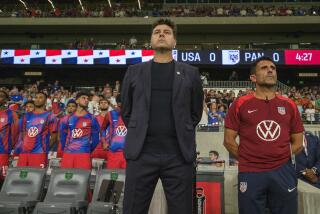U.S. Soccer Looking for a New Approach
- Share via
Bruce Arena’s eight-year tenure as U.S. men’s soccer coach came to an end Friday, leaving behind a mixed bag of achievement and disappointment that underscored the notion that it’s better to be lucky than good only until the luck runs out.
Arena, whose contract with U.S. Soccer will not be renewed when it expires at year’s end, will be remembered mostly for his two World Cups, coaching the United States to unlikely heights in 2002, when the Americans reached the quarterfinals, and then bottoming out with a last-place group finish in 2006.
“I’m not saying we need to change direction; the direction Bruce set is very positive,” U.S. Soccer Federation President Sunil Gulati said in a conference call Friday.
“But having a fresh approach after eight years, which is a very long time, is the strongest factor.”
Another factor could be having the most acclaimed coach of the 2006 World Cup, Juergen Klinsmann, available and handy, conveniently nestled in his Huntington Beach home after guiding Germany to a surprising third-place finish.
Klinsmann resigned as Germany’s coach earlier this week and has the credentials Gulati said he’s looking for in Arena’s successor -- “some knowledge of American soccer, experience, leadership, a track record of success.”
Klinsmann captivated the host country, and captured Gulati’s attention, by uprooting Germany’s traditionally stoic brand of soccer and replacing it with an attacking style that produced victories over Costa Rica, Poland, Ecuador, Sweden and Argentina before extending Italy to the last three minutes of extra time in a 2-0 semifinal defeat.
Gulati said Klinsmann “has had success with the German team, he has a much better handle on the American soccer scene than someone who hasn’t spent time here, he’s inquisitive. He’s an intelligent guy, multilingual, with a lot of very positive qualities.”
Arena, 54, is easily the winningest coach in U.S. history, compiling a 71-30-29 record, more than doubling the victory total of runner-up Bora Milutinovic’s mark of 30-35-31.
His 2002 team reached the World Cup quarterfinals, where it played gamely in a 1-0 loss to eventual runner-up Germany. That run gifted Arena a four-year cushion during which the U.S. media treated him as part Midas and part wizard, a honeymoon that came to a crashing end last month in Germany, when the United States sandwiched listless defeats to the Czech Republic and Ghana around one inspired performance in a short-handed 1-1 draw with Italy.
Arena’s strategy and personnel decisions were skewered by the U.S. media, notably ESPN analyst Eric Wynalda, a former U.S. player, who said the difference between 2002 and 2006 for Arena was that “the horseshoe fell out of his back pocket.”
In 2002, Arena took advantage of his team’s outsider status and a first-ever World Cup in Asia that left the body clocks of European and South American powers off kilter, especially early in the tournament.
Portugal arrived overconfident and out of sorts for its opener against the United States. The Americans scored three quick goals before the Portuguese gained their bearings and rallied, with the U.S. holding on for a 3-2 victory.
The U.S. followed that with spotty performances in a 1-1 draw with South Korea and a 3-1 loss to Poland, but advanced as the second-place finisher in its group when Portugal lost to South Korea.
That earned the U.S. a second-round matchup against regional archrival Mexico on neutral soil, far from the madding climes of Azteca Stadium. American soccer players can always get up for a match against Mexico and won that one, 2-0, to set up the quarterfinal appearance that remains the glittering bauble on Arena’s resume.
Arena did not have the same charmed path in 2006, when his team was thrown into a brutally competitive group that included eventual champion Italy, the Czech Republic and Ghana.
Arena tinkered with his lineup for the opener against the Czechs and paid dearly for it in a 3-0 thrashing.
He stayed with a defense-minded 4-5-1 formation throughout most of group play, resulting in a toothless attack.
The U.S. managed two goals in three games -- one an own goal by Italy. Midfielder Clint Dempsey was the lone player to score for the U.S., his goal coming in a tournament-ending 2-1 loss to Ghana.
Arena is reportedly the leading candidate to become the new coach of Major League Soccer’s New York Red Bulls, which would return him to the league where he won two championships with D.C. United.
*
(BEGIN TEXT OF INFOBOX)
The last 30 years
Bruce Arena experienced success as coach of the United States men’s soccer team, including 71 victories during his eight-year tenure. The U.S. Soccer Federation announced Friday that Arena’s contract would not be renewed when it expires at the end of the year. Comparing Arena with U.S. coaches since 1976:
*--* Coach Year(s) Record Bruce Arena 1999-2006 71-30-29 Steve Sampson 1995-1998 26-22-14 Bora Milutinovic 1991-1995 30-35-31 John Kowalski 1991 1-1-1 Bob Gansler 1989-1991 14-15-6 Lothar Osiander 1986-1988 4-10-5 Alkis Panagoulias 1983-1985 6-5-7 Bob Gansler 1982 1-0-0 Walter Chyzowych 1976-1980 8-14-10
*--*
Note -- Before 1976, no coach had a tenure longer than 10 games.
Source: U.S. Soccer
Los Angeles Times






